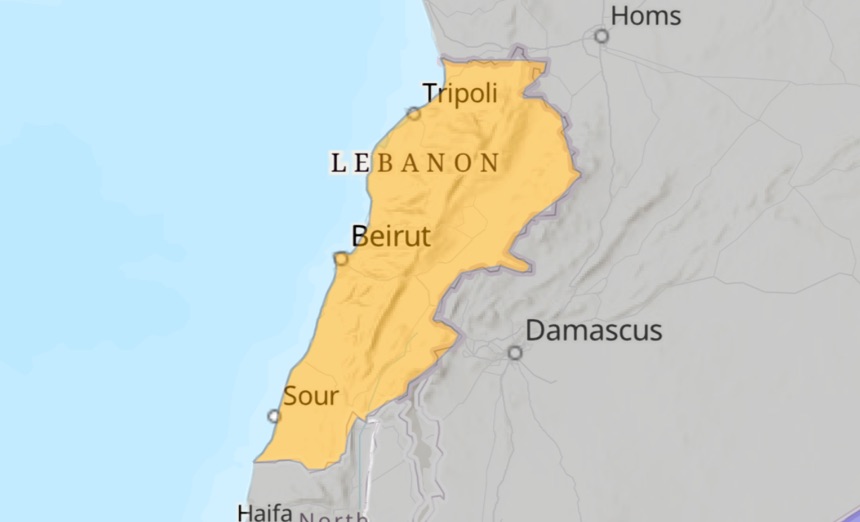The political and military situation in Lebanon is becoming more and more volatile, aggravated in particular by the Beirut port explosion in 2020. The country is also engaged in an armed conflict with Israel, due to the latter's occupation of part of Lebanese territory, the Shebaa Farms.1 While the country does not suffer from significant levels of arms and ammunition trafficking,2 it remains heavily contaminated with landmines and other types of unexploded ordnance from past conflicts.3
The Mines Advisory Group (MAG) and the Small Arms Survey are working on the ground to support the through-life management of ammunition, in collaboration with the Lebanese Ministry of Defence. Efforts have included constructing and upgrading ammunition storehouses; carrying out mine clearance; providing physical security and stockpile management training to national forces; conducting technical assessments on prior interventions; and contributing to disarmament, demobilisation and reintegration (DDR) efforts.4
1 "Lebanon," Rule of Law in Armed Conflicts Project (RULAC), Geneva Academy of International Humanitarian Law and Human Rights, updated October 23, 2017, https://www.rulac.org/browse/countries/lebanon#collapse1accord.
2 Philip Alpers and Miles Lovell, Lebanon – Gun Facts, Figures and the Law (GunPolicy.org, Sydney School of Public Health, University of Sydney, 2022), https://www.gunpolicy.org/firearms/region/lebanon.
3 "Lebanon: Impact,” Landmine & Cluster Munition Monitor, 2021, http://www.the-monitor.org/en-gb/reports/2020/lebanon/impact.aspx.
4 “Ammunition Management Activity Platform (A-MAP),” GICHD, 2022, https://a-map.gichd.org.
Launch the country dashboard
Further information
Accidental explosions
Since the Small Arms Survey began collecting data in 1979, numerous accidental explosions have been reported in Lebanon.
Table 1. Accidental explosions in Lebanon (1979–2021)
Year | Location | Owner/manager | Deaths | Injuries |
2021 | Bourj el-Chemali | Non-state (actor) | N/A | N/A |
2020 | Ain Qana | Non-state (actor) | 0 | 0 |
2020 | Beirut | N/A | 190+ | 6000+ |
2012 | Baalbek | Non-state (actor) | 3 | 4 |
2012 | Tair Harfa | Non-state (actor) | 3 | N/A |
2012 | Tripoli | Non-state (actor) | N/A | 3 |
2011 | Siddiqine | Non-state (actor) | 0 | 0 |
2010 | Al Tayri | foreign (peacekeeping) | 0 | 11 |
2010 | Shehabiyya | Non-state (actor) | N/A | N/A |
2009 | Khirbet Selm | Non-state (actor) | N/A | N/A |
2009 | Tayr Filsi | Non-state (actor) | 5 | N/A |
2005 | Majadel | Non-state (actor) | 0 | 0 |
2005 | Majadel | Non-state (actor) | 0 | 0 |
Source: “Unplanned Explosions at Munitions Sites (UEMS) Database,” Small Arms Survey, updated December 15, 2021, https://smallarmssurvey.org/database/unplanned-explosions-munitions-sites-uems.
Cases of diversion
Several cases of diversion have been reported since 2012 in Lebanon.
Table 2. Cases of diversion of arms, ammunition and explosives in Lebanon since 2012
Year | Location | Description |
2012 | Beirut | More than 90 machine guns were stolen from an army depot, in addition to large quantities of ammunition. |
Source: “Lebanese Army Weapons Stolen,” SP's MAI – Military, Aerospace and Internal Security, November 16, 2012, https://www.spsmai.com/internal-security/?id=1815&q=Lebanese-Army-weapons-stolen.
Disposal
Insufficient information on the disposal of ammunition in Lebanon.
Needs
No needs have been reported for Lebanon.
Source: Lebanon, National Report on the Implementation of the Programme of Action on Small Arms and Light Weapons (PoA) and the International Tracing Instrument (ITI) (New York: Permanent Mission of Lebanon to the UN, 2008), https://unoda-poa.s3.amazonaws.com/poa-reports-le/2008%40109%40Lebanon.pdf.



